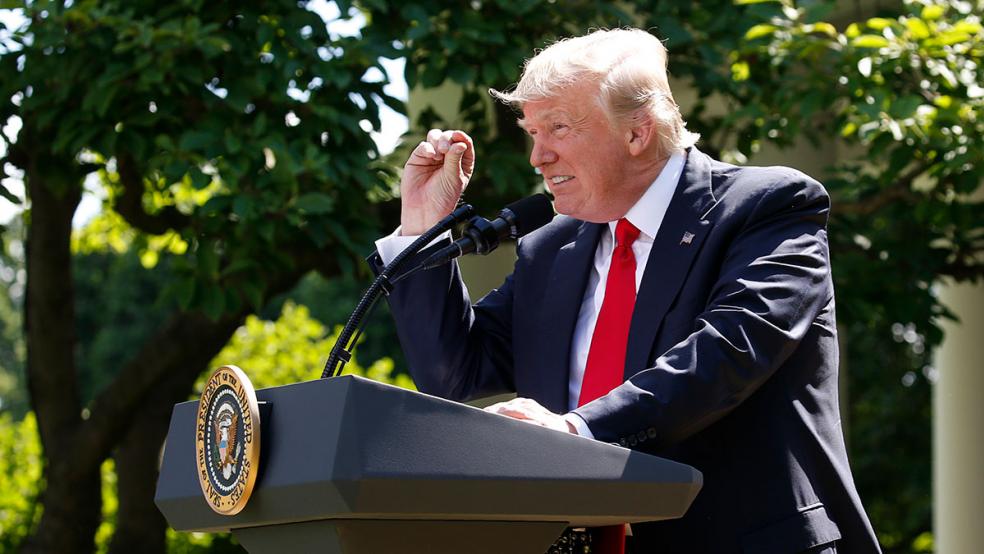The White House and Republican leaders on Thursday renewed their call for a major overhaul of the federal tax code this year.
"We are all united in the belief that the single most important action we can take to grow our economy and help the middle class get ahead is to fix our broken tax code for families, small business, and American job creators competing at home and around the globe,” the six officials including House Speaker Paul Ryan (R-WI) and Treasury Secretary Steven Mnuchin said in a joint statement.
But some Republicans and conservative activists believe that it’s too late to pass major tax reform this year after months of wasted effort on Capitol Hill trying to repeal the Affordable Care Act. Instead, they say, President Trump and Congress should push for passage of a much narrower tax cut -- one aimed at corporations and middle class families that has a better chance of being enacted.
Related: Why Trump’s Tax Cut Is a Tough Sell to the Poor and Middle Class
A group of conservative economists and political analysts including Stephen Moore, Larry Kudlow, Arthur Laffer and Steve Forbes are urging the Trump administration to greatly scale back its ambitions and push instead for enactment of a small package of measures they call “Three Easy Pieces.”
“We’ve been talking about this now for several months, and basically the idea is that tax reform isn’t going to happen this year,” Moore, founder of Club for Growth and a visiting fellow at the conservative Heritage Foundation, said in an interview Thursday. “We’re all for tax reform, but there just aren’t enough calendar days to get this done. And given the fiasco of Obamacare [repeal], Trump needs a victory this year.”
“And so, the question is what is attainable?” he said. “And so this is basically kind of a scaled back tax cut.”
The proposal calls for a sharp reduction in the top corporate tax rate from 35 percent to 15 percent; a doubling of the standard deduction that millions of average taxpayers claim; and a repatriation measure that would allow multi-national corporations to bring money back from overseas without a substantial U.S. tax penalty.
Related: How Trump’s Tax Cut Plan Would Blow Up the Deficit
Moore said the three tax cut measures would likely cost between $2 trillion and $3 trillion over the coming decade, although some of that cost would be offset by a projected surge in tax revenues brought on by economic expansion.
But because the proposal isn’t paid for and would add to the long-term debt, Congress would have to sunset the provisions in ten years, to avoid running afoul of the budget reconciliation rules that would be used to pass the bill.
The Trump administration and Republican leaders have supported the three provisions as part of a larger revision of the federal tax law.
However, Moore said that his “Three Easy Pieces” plan so far has received mixed reviews at the White House, with some officials intrigued by it and others highly dismissive. “I’m not going to name names of people that we met with,” Moore said. “I’ll simply say that we’ve gotten a pretty receptive response to this idea.”
Related: Will Burying the Border Tax Give New Life to GOP Tax Reform Efforts?
Moore and Kudlow were both economic advisers to the Trump campaign last year and have remained in touch with White House officials since the president took office.
The Washington Post reported that Kudlow, a prominent economic analyst and TV personality, met with senior White House officials, including cabinet members, two weeks ago and also had a private meeting with Trump where he pitched the idea of going for the three tax measures if Republicans fail to come together quickly on a more comprehensive package of reforms.
“It’s settling in, especially as the Obamacare things drags on,” Moore said of the meetings. “Trump himself is getting more and more desperate for a victory. Trump is very open minded on this” and hasn’t ruled anything out.
Mnuchin and National Economic Council Director Gary Cohn reportedly are dismissive of the plan and are pursuing reforms on the scale of the historic 1986 tax reform legislation that would slash corporate and individual tax rates but also eliminate scores of long-standing tax breaks to offset the cost of the tax cuts.
Mnuchin and Ryan are part of the so-called “Big Six” – including Ryan, House Ways and Means Committee chair Kevin Brady of Texas, Senate Majority Leader Mitch McConnell of Kentucky, and Senate Finance Committee chair Orrin G. Hatch of Utah – who are coordinating efforts to write major tax reform legislation this year.
Related: The Best and Worst States for Sales Taxes
One important development Thursday was the decision by the group was to drop a controversial border tax proposal. Ryan and Brady devised and staunchly promoted the import tax to help offset the cost of the overall tax package. However, it was vigorously opposed by the Trump administration and a powerful and vocal bloc of business leaders and conservative activists.
However, yesterday’s “Big Six” joint statement offered few other insights to the evolving Republican tax package. Some House conservatives reportedly are growing restless as Ryan, Brady and White House officials continue to try to thread the needle in devising tax cut schemes and offsets that they can sell to lawmakers and special interest groups that will have a big say in the final contours of the package.
Trump’s economic team has floated ideas for offsetting as much as half of his individual and business tax cuts by closing many loopholes and eliminating deductions. Even then, however, the Trump plan would add $3.5 trillion to the federal debt over the coming decade, according to a recent Tax Policy Center analysis.





